China’s Pacific push amid coronavirus shows Australia’s foreign policy shortcomings
It’s too early to say what COVID-19 will do for allegiances in the Pacific but Australia is already on the back foot with China using aid to win friends and influence our neighbours.
Coronavirus
Don't miss out on the headlines from Coronavirus. Followed categories will be added to My News.
Last month a Zoom-style teleconference was held that sent shockwaves through the halls of the headquarters of the Department of Foreign Affairs and Trade in Canberra.
The conference host China had up on screen senior health officials from 10 Pacific nations to discuss how the Asian giant was going to help them overcome the coronavirus crisis.
If the capacity of China to speed dial these figures at short notice on March 10 was a surprise to those in DFAT’s RG Casey Building then so too was what followed in the way of cash, medical equipment and other essential supplies.
A seven-person medical team with more than eight tonnes of kit arrived in Cambodia alone within days while in Vanuatu a giant novelty cheque was delivered to that nation’s foreign minister, $US100,000 made out to the government of Vanuatu.
“Good friends feel close even when they are thousands of miles apart,” Chinese Ambassador to the South Pacific republic Zhou Haicheng imparted before gushing how China appreciated the “valuable support” the tiny island had provided in return to China.
That support was simply by pledging allegiance.
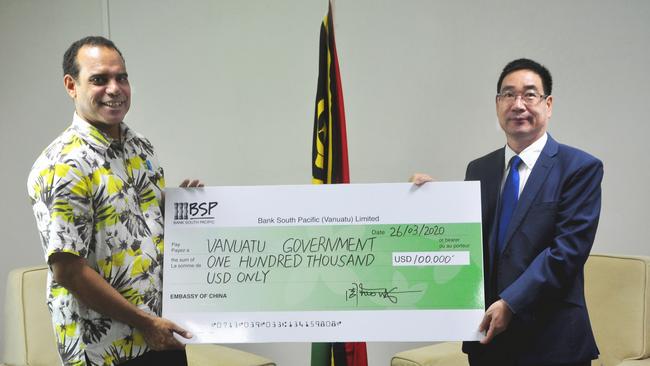
Similar teleconferences were held within the week by China’s health officials with other nations, including a Zoom with Eastern European nations, Japan and South Korea, Africa and even Costa Rica and French Polynesia got a one-on-one.
Goods have followed by air and sea.
Fiji got 47 military vehicles to combat the virus, Australia’s Defence Department had no idea.
“That they did that was not a surprise but how quickly they did it was and caught a few people off guard,” one senior Australian foreign office diplomat told News Corp Australia of China’s regional outreach.
“We were all still dealing with the fallout of the pandemic, Australia and Australians, but they were already out with gifts in hand and that has taught us a few things.”
One of those lessons was how out of step Prime Minister Scott Morrison’s multi-billion Pacific Step-up program has been when at the first sign of a global crisis, all focus and attention was to domestic issues; a correct attitude perhaps for the first few weeks but months on and the obsession remains on how many hospital beds, bad boats and misbehaving backpackers we have.
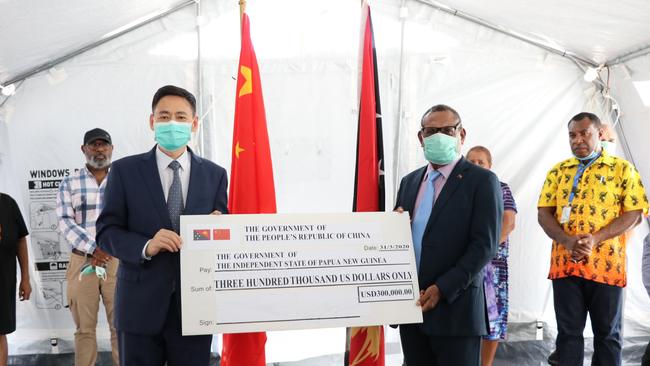
If this is to be the Battle of the Pacific we had to have, then we have lost the first round.
The shame is that foreign aid in this country is still seen as some Big Brother moral obligation when it needs to be seen as a strategic imperative.
Given the crisis in America and its foreign policy shift to be more insular and nationalist a question mark hangs on its capacity to maintain an active role in the region.
While regionally nations are still grappling with the domestic handling of the COVID-19 crisis and who – or WHO (World Health Organisation) – is to blame, China has been offering solutions to nations around the globe.
Specifically in the Pacific though, China has trumpeted to Asian neighbours that at a crisis it is outwardly looking and there to help.
To rub it in, it has also been flagging privately to Pacific nations that the even once mighty United States has not been around with its aircraft carrier USS Theodore Roosevelt forced to flee to cope with a coronavirus outbreak of more than 600 crew.
In total more than 150 US military bases have suffered COVID-19 cases including at all but one of its nuclear facilities.
Some of the hardest hit are US assets in Japan where the US military has declared a public health emergency at its air and sea bases.
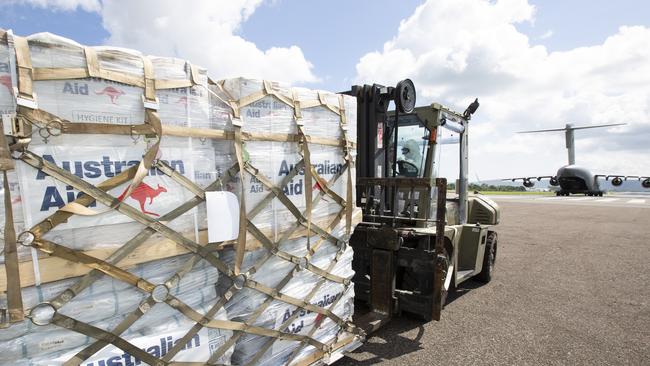
For Australia, desperate to shore up Pacific friends in good times and bad, what corona has done has highlighted when it comes to manufacturing China is the world’s leader and can reach out anywhere, anytime to anyone needing it.
Australia cannot compete.
And while the Federal Government is at pains to claim there is no competition in the Pacific between it and China, it’s telling that days after China pledged ventilators for the Solomon Islands Australia found a couple of spares and also pledged them for that country.
Similar followed for Tonga and PNG.
Professor Rory Medcalf, head of the ANU National Security College has had three decades experience in intelligence, diplomacy and academia and said while China’s charm offensive is outwardly appreciated – no less than by the United States where the White House readily heaped praise in exchange for received consignments of medical goods from their sometime trade rival – it has raised red flag concerns for a region at a cross roads of alliance realignment.
But he said it is too early to say what COVID-19 will do for allegiances in the Pacific.
“There is a paradox in that China appears to have performed strongly in limiting the spread internally after the outrageous initial cover-up and now is trying to project being a good citizen internationally,” Prof Medcalf said today.
“But I think that a lot of the response from the region and the rest of the world is extremely more wary below the surface than it is on the surface. I think there is now a long-term quite profound resentment and wariness about China that this crisis has engendered even if China is delivering some kind of assistance in the short term.”
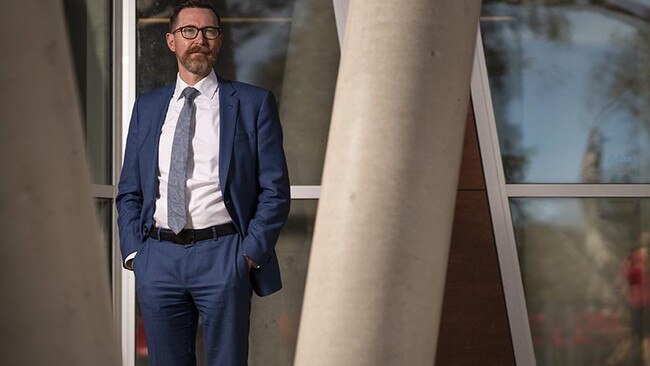
In the past fortnight it has renewed pressure on Taiwan, launched a propaganda war with the US, France and even bizarrely Kazakhstan which it said would soon return as a state of China.
It is feuding with Thailand over social media harassment of a Thai public figure, has put much of Africa off-side by alleged treatment of African-origin people in their country, notably Nigerians living in Guangzhou, and even chased, rammed and sank a Vietnamese fishing boat before rescuing the hapless fishermen in contest South China Sea waters.
It is also sending spy planes and survey vessels into territories of Vietnam and the Philippines and is clashing with Indonesia.
Then of course there are its questionable low COVID-19 death and sick toll and the poor quality medical masks and gowns, likened to having the resilience of a piece of tissue.
But the growing distrust of the apparent gift giving of Trojan horses by China could play into Australia’s hands with Professor Medcalf believing the Federal Government has not taken any missteps yet in the crisis but could now look to seize the moment.
And in a limited way it has already begun that through weekly quadlateral dialogues with the US, India and Japan now adding in other nations like Vietnam and South Korea.
“There is an opportunity for Australia not only to exert influence but to try and build coalitions of co-operation in the region … this is really quite a unique convergence of geopolitical competition and a transnational shock … so the next 12 to 18 months will be quite a transformational moment in regional and global stability and a whole lot of things can go wrong.”
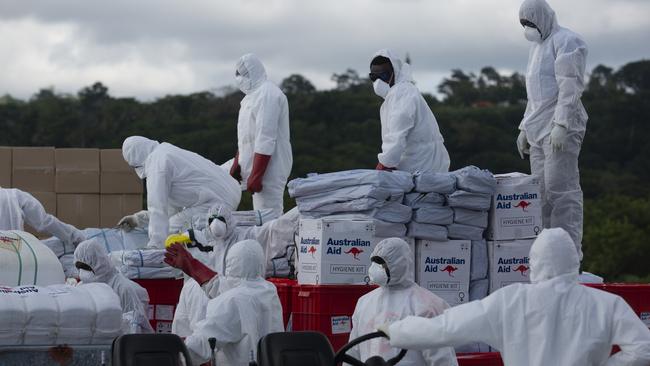
Last week Australia did provide aid to Vanuatu, albeit for the Category 5 Cyclone Harold superstorm that has left tens of thousands of people homeless in Vanuatu alone, let alone the havoc and death it has wreaked in Fiji, Tonga and the Solomon Islands.
Foreign Minister Marise Payne said Australia has “strongly engaged” with Pacific partners and was now assisting with health expertise and other advice for public information campaigns via regional institutions including WHO.
She said the Australian government had moved quickly to “reorient our development partnerships” to bring forward already pledged health services funding.
Prior to the cyclone it was UNICEF and its partners that provided 170,000 essential medical packs including respirators, masks, gowns and corona testing kits but has not the capacity to do more.
“Our small size and limited resources makes us extremely vulnerable during an emergency crisis like this,” UNICEF Pacific Communications Officer Zubnah Khan blogged.
That help has to come from countries like Australia and New Zealand.
Strategically Australia has moved to better engage neighbours, reopening a mothballed naval base in PNG and offering to refurbish facilities in Fiji and the Solomons but COVID-19 has highlighted one significant shortfall – Australia’s manufacturing base is reliant on China for so many goods, it has to act as a middle man to source them from China for the Pacific when China can dispatch to the Pacific direct.
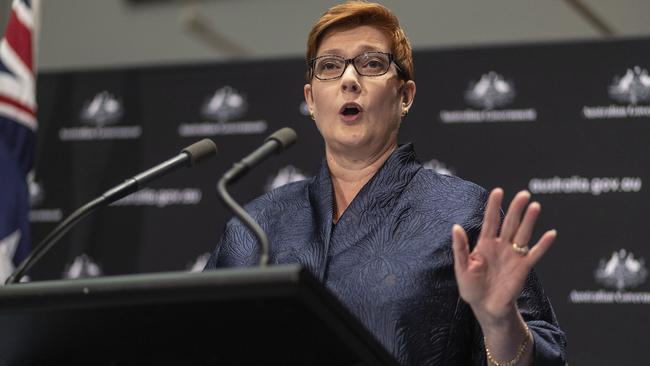
Pacific Islands think short term and readily accept Chinese pledges of cash and goods for infrastructure but the long term payback is less considered.
Despite this Australia remains the biggest aid donor to the region, a move it is hoped can continue to guarantee open waterways and access to offshore facilities; areas China has a strong desire to achieve.
Mr Morrison late last month told G20 partners there was never a more important time than to help the Pacific but curiously just when that help will come is unclear.
Ms Payne said today COVID-19 was a significant global crisis with ramifications for the Pacific.
“We recognise that this is an impact on the world which will have significant flow-on effects to international relationships, to our stability and security in our own region,” she said.
“So we’re focused on supporting our friends in the Pacific, friends in South East Asia, Indonesia in particular, Timor-Leste, Papua New Guinea, making sure that when we are able to provide support Australia is delivering that.
“And then of course looking beyond, how we do move beyond coronavirus experience and how we do re-engage and make sure that the things that are important to us as Australian, our values, the rule of law, the human rights that we focus on are still a core part of how we do business.”
Originally published as China’s Pacific push amid coronavirus shows Australia’s foreign policy shortcomings
